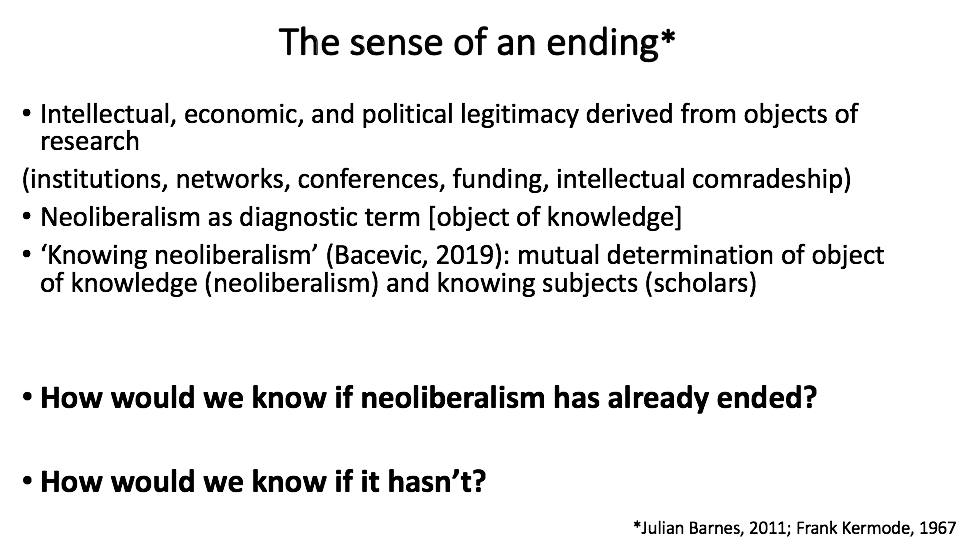Super-happy to be presenting one of my favourite papers tomorrow - & #39;What was neoliberalism and what comes next? A political economy of endings& #39;, 9.15 AM BST at @CPERN06 Mid-term workshop. Tune in to the live streaming at https://www.facebook.com/events/2820136938114090">https://www.facebook.com/events/28... https://twitter.com/CPERN06/status/1273597063239000064">https://twitter.com/CPERN06/s...
The link and Facebook streaming were a bit slow, so I& #39;ve decided to share some of the slides from today& #39;s talk:
My talk addresses some of the epistemological implication of thinking about endings - including, but not limited, the end of neoliberalism. I& #39;ve addressed some of these in this paper: https://www.tandfonline.com/doi/full/10.1080/02691728.2019.1638990">https://www.tandfonline.com/doi/full/...
The title of the talk references Katherine Verdery& #39;s & #39;What ws socialism and what comes next?& #39;, published in 1996, which addressed the difficulties of grappling with the & #39;post-socialist& #39; condition.
The ambiguity of endings is reflected in social sciences and humanities& #39; inability to think without endings; but, at the same time, to think about endings. This ambiguity appears in a number of philosophical and theoretical takes, but also involves interesting political questions
Hannah Arendt& #39;s & #39;Human condition& #39;, for instance, frames the genesis of the & #39;theoretical& #39; stance as oriented towards eternity - which is atemporal, and as such opposed to immortality
(there is an in-between slide that references Jenny Andersson& #39;s & #39;Future of the world& #39; and SM Amadae& #39;s & #39;Prisoners of reason& #39; as genesis of future as a political-epistemic project): https://global.oup.com/academic/product/the-future-of-the-world-9780198814337?cc=gb&lang=en&">https://global.oup.com/academic/...
I wholeheartedly recommend reading both https://www.cambridge.org/core/books/prisoners-of-reason/0C3FF0AC512060E6A62A01AC77CCFA71">https://www.cambridge.org/core/book...
So how did this Cold War legacy frame the ability to predict events closer to our topic today?
What does this mutual determination of epistemic object and epistemics subject - which I address in my paper - tell us about how we are able to & #39;know& #39; or think about endings?
that& #39;s it  https://abs.twimg.com/emoji/v2/... draggable="false" alt="😃" title="Lächelndes Gesicht mit geöffnetem Mund" aria-label="Emoji: Lächelndes Gesicht mit geöffnetem Mund">
https://abs.twimg.com/emoji/v2/... draggable="false" alt="😃" title="Lächelndes Gesicht mit geöffnetem Mund" aria-label="Emoji: Lächelndes Gesicht mit geöffnetem Mund">

 Read on Twitter
Read on Twitter







